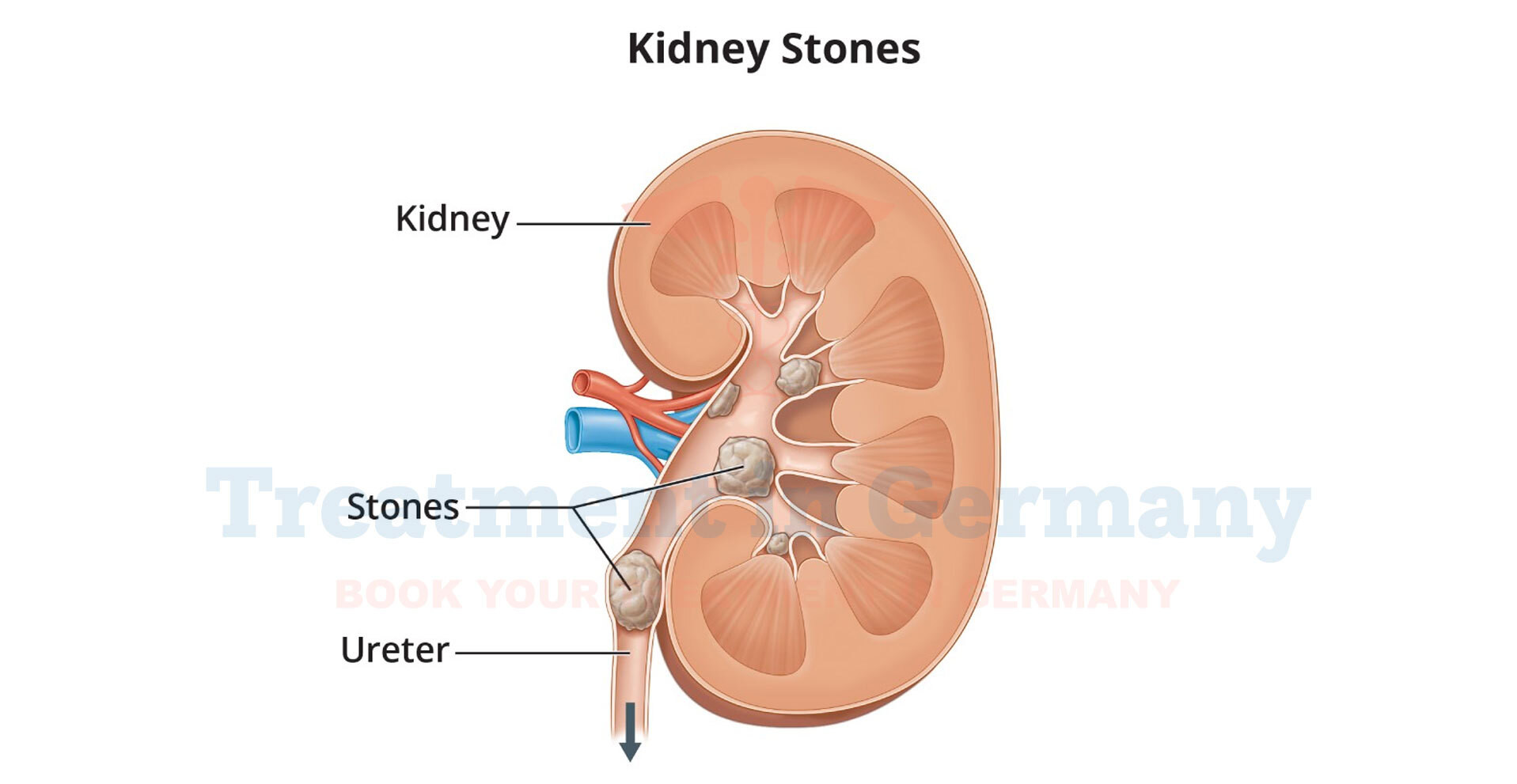Kidney stones are also referred to as nephrolithiasis and stones are composed of minerals, salts, and organic substances that form in the kidney. These stones are one of the most regular diseases in the urinary tract, causing much pain and, in some cases, dangerous consequences. Germany is the best in medical technologies, equipment, and, most of all, professional medical care.
In this article, the author discusses the symptoms, the possible causes, factors increasing the risk of the disease, diagnostic activities, and the possibilities of treatment in Germany.
Kidney stones are solid lumps or crystals that develop from materials in your kidneys, such as salts, minerals, and acids. As tiny as a grain of sand or, in rare cases, bigger than a golf ball, they can be found. Other names for kidney stones are nephrolithiasis or renal calculi.
Symptoms of Kidney Stones
The most characteristic signs of kidney stones are sharp and severe localized pain in the flanks, which can spread down the lower back, abdomen, and groin area. Even this pain may be called colic, mainly due to its rhythmic nature. When some kids go through severe pain, suddenly it comes and goes within a short time.
Additional symptoms include:
The minor round stones likely go unnoticed, while the major round stones may lead to severe complications that demand medical intervention.
Causes of Kidney Stones
Kidney stones are formed when the urine has a high concentration of some elements, such as calcium, oxalate, and acid urine. They precipitate, particularly when there is an inadequate quantity of urine or it is highly concentrated.
Contributing factors include:
Risk Factors for Kidney Stones
Certain conditions and lifestyle factors elevate the risk of developing kidney stones, including:
If one does not seek medical attention, the following are common sequelae of renal stones, such as hydronephrosis, pyelonephritis, and chronic kidney disease (CKD).
Diagnosis of Kidney Stones in Germany
German medical science has high diagnostic capability for determining the stone in the kidney, its size, and its location. Common diagnostic methods include:
Urine Tests
The dipsticks analyze blood, infection, or substances that form crystals in urine and help understand how stones form.
Imaging Techniques
Blood Tests
Kidney function tests are done to see how well your kidneys are working and to test for levels of calcium or uric acid, which contribute to stone formation.
Treatment Options for Kidney Stones in Germany
Healthcare in Germany provides advanced methods of treatment of kidney stones. Management depends on the size of the stone, its location, or whether it leads to symptoms or complications.
Medications
Hence for the smaller stones, which should pass naturally, tamsulosin and nifedipine help to relax the ureter muscles to aid in the passage of the stone. It is also available with pain relief medications and methods to control nausea.
Minimally Invasive Procedures
The following are the minimally invasive procedures:
Shockwave Lithotripsy
This non-invasive procedure uses sound waves to blast the stones into small pieces and is therefore easier to pass through the urinary system.
Ureteroscopy
A thin telescope, the endoscope, is passed through the urinary tract to locate and then remove the stones. This procedure is useful when the stone is impacted in the ureter or bladder.
Percutaneous Nephrolithotomy
For larger stones or complicated cases, a minor surgery is conducted at the back through the use of special equipment to carry out the process.
Laparoscopic Surgery
Through this non-invasive surgery, large stones are removed through minimal incisions as a result of their size. Occasionally, an open surgery may be performed.
Prevention of Kidney Stones
Therefore, it is crucial to take steps to try and prevent the condition from recurring. Strategies include:
Lifestyle Changes
Medications and Monitoring
Why Choose Germany for Kidney Stone Surgery Treatment?
Germany has some of the best-equipped hospitals, highly developed technologies, and focuses on the patient's needs. Key benefits include:
Frequently Asked Questions
What is the composition of the primary symptoms of kidney stones?
Some of the main signs include pain in the flank area, blood in urine, and a person feeling a burning sensation when answering the call of nature. These symptoms usually point towards the presence of stones in the urinary tract.
How are kidney stones identified as a medical condition in Germany’s hospitals?
It entails urinalysis and blood tests, X-rays, CT scans, and ultrasound to identify the nature, location, and size of the stone.
What medications help in passing kidney stones?
Tamsulosin and nifedipine are often recommended because they help to prevent the ureter from spasming, therefore making the passage of the stone easier.
What surgical procedures can be available in Germany?
This includes shockwave lithotripsy, ureteroscopy, percutaneous nephrolithotomy, and in serious cases, laparoscopic surgery.
Can kidney stones be prevented?
Yes, by drinking enough water, having no diet with high amounts of calcium or vitamin C, and consulting a dietitian, the formation of kidney stones can be minimized.
👉 Contact us for further information and receive a complimentary consultation.


.webp)
 (1).webp)

.webp)
 (1).webp)


.webp)
 (1).webp)

.webp)
 (1).webp)
